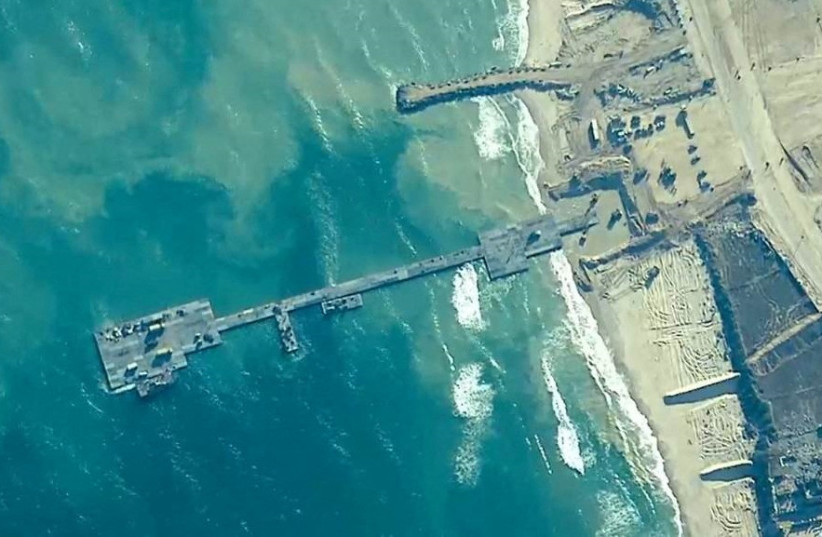The first trucks carrying humanitarian assistance from the US military floating pier connected to Gaza have moved ashore, US Central Command and the UN said on Friday.
No US troops went ashore in Gaza for the delivery of aid.
White House National Security Communications Adviser John Kirby said there is a “small component” of US troops on the pier to assist with logistics and security. Navy vessels will assist with transporting material from larger cargo vessels to the pier.
Kirby was quick to dispel reports that US forces will be in the region in a military or operational capacity. No IDF troops will be stationed on the pier.
“This is an ongoing, multinational effort to deliver additional aid to Palestinian civilians in Gaza via a maritime corridor that is entirely humanitarian in nature, and will involve aid commodities donated by a number of countries and humanitarian organizations,” according to a statement from Central Command.

Protecting the aid from Hamas
Kirby said additional aid from the US and other countries is arriving in Cyprus where it will be screened by Israeli authorities.
The first delivery trucks on Friday consisted of 300 pallets of aid from the UAE. Kirby said USAID will provide initial contributions of more than 170 metric tons of nutrient rich food bars to support 11,000 of the most vulnerable children, adults ready-to-use therapeutic foods to treat more than 7,200 cases of severe wasting and nearly 90 metric tons of critical supplies such as plastic sheeting for shelter, Jerry cans to hold clean water and hygiene kits to support more than 33,000 people.
The UN said the World Food Program will be managing a “logistics cluster” on behalf of different UN agencies and will facilitate the flow of aid, including the coordination of the arrival of empty trucks and the dispatch to warehouses across Gaza, a UN spokesperson said.
The UN said it will oversee distribution of aid to ensure it does end up in Hamas’ hands.
According to the UN, security arrangements are in place to protect the convoy of trucks leaving the floating docks.
The White House said Israel offered “explicit assurances” that it will not strike any of the vehicles taking aid off the pier.
“We remain vigilant to potential threats to the armed service members that are working on the pier, humanitarian aid organizations and workers helping with the distribution and the collection at the marshaling area on the ground,” Kirby said. “It remains a top priority. We’re going to remain laser-focused on ensuring the safety of everybody involved in this effort.”
International agencies and organizations have repeatedly said the aid distribution from the floating pier is not sufficient to replace ground transportation routes.
According to the UN, the Rafah crossing remains closed. The Kareem Shalom crossing is now operational although there are prevailing security and logistical conditions hampering humanitarian aid deliveries with upwards of five hour delays.
On Thursday, Kirby said more than 360 trucks entered Gaza.
Between April 5 and May 16, Kirby said an average of 176 trucks entered Gaza per day.
“So as a result, very limited supplies have entered Gaza since the Sixth of May, and the quantities have been insufficient to address the needs which are immense,” the UN spokesperson said.
Approximately 400,000 people remain in Rafah though its difficult for the UN to accurately estimate.
